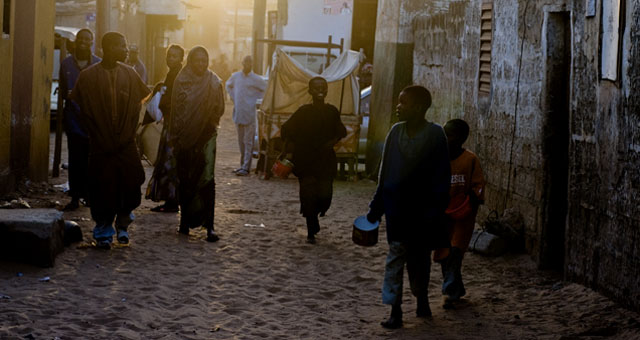Disclaimer: This article is more than 12 years old, and may not include the most up-to-date information or statistics. Please verify information with more recent sources as needed, and if you have any questions contact our Press Office.
23 February 2012
Politicians must not use the upcoming Senegalese election (26 February) as an excuse to close their eyes to an abuse scandal currently taking place by religious teachers in Senegal responsible for the child slavery of an estimated 50,000 children, say Anti-Slavery International and CAINT, a Senegalese charity.
The human rights organisations are launching on Thursday (23 February) a new report, ‘Time for Change’, which makes an urgent call to end the forced child begging of talibés (students) in Senegal and demands that politicians crack down on the criminal Koranic teachers who force children to beg for their own profit.
Ibrahima Lo, President of CAINT says: “The failure of both the current government and prospective candidates to take on the issue of child forced begging in Senegal lies in the unwillingness to oppose and contradict religious leaders of the Islamic Brotherhoods because of their political influence with their disciples.
“It is clear that the politicians are closing their eyes and ignoring an abuse scandal in order not to prejudice their election hopes. It is unacceptable that politicians think first of their own careers to the detriment of the safety of children. There is an urgent need for the government to tackle the criminal fringe of certain Koranic masters responsible for these crimes.”
Talibés are young boys, aged between 5 and 14, who receive a Koranic education at a Daara (Islamic school) by a Marabout (spiritual guide) or Koranic teacher. Most Daaras are in Dakar and other towns and cities and the talibés are the children of the rural poor who can not afford to send their children to a local school.
Without the protection of their families, the children totally rely on their teacher for their well being. Senegalese society usually donates small amounts to Koranic teachers, as part of their Islamic observance, which goes towards the upkeep of these Islamic schools.
However, in recent years this situation has been perverted and there are now an estimated 50,000 talibés in Senegal forced to beg for up to seven hours a day and for the personal profit of their teacher. They are not receiving a proper Islamic education and many face physical abuse if they feel to bring enough money each day.
Catherine Turner, Child Labour Programme Co-ordinator, said: “Forced child begging is one of the worst forms of child labour and despite being clearly visible, tens of thousands of talibés are still suffering in Senegal. The government must enforce its own laws to protect talibés from this abuse.”
Anti-Slavery International, CAINT and the rest of PPDH, a coalition of 47 Senegalese charities working on the issue of forced child begging in Senegal, believe that one of the key solutions to the problem would be to accelerate the ‘modern daara’ programme. Modern daaras would be under State regulation and ensure minimum standards of care, as well as teach a wider curriculum, including maths and French.
The coalition also want the Senegalese government to amend the criminal code to remove any doubt over the prohibition of forced child begging and to strictly enforce of the law against those responsible, as well as raise awareness of the harmful effects of the problem with the wider public and to do more to rescue, rehabilitate and reintegrate talibés.
To read ‘Time for Change: A call for urgent action to end the forced child begging of talibés in Senegal’, produced by Anti-Slavery International and PPDH, visit here for the English version and here for the French version.
For further press information:
contact Paul Donohoe, Anti-Slavery International’s Press Officer on 020 7501 8934 p.donohoe@antislavery.org



